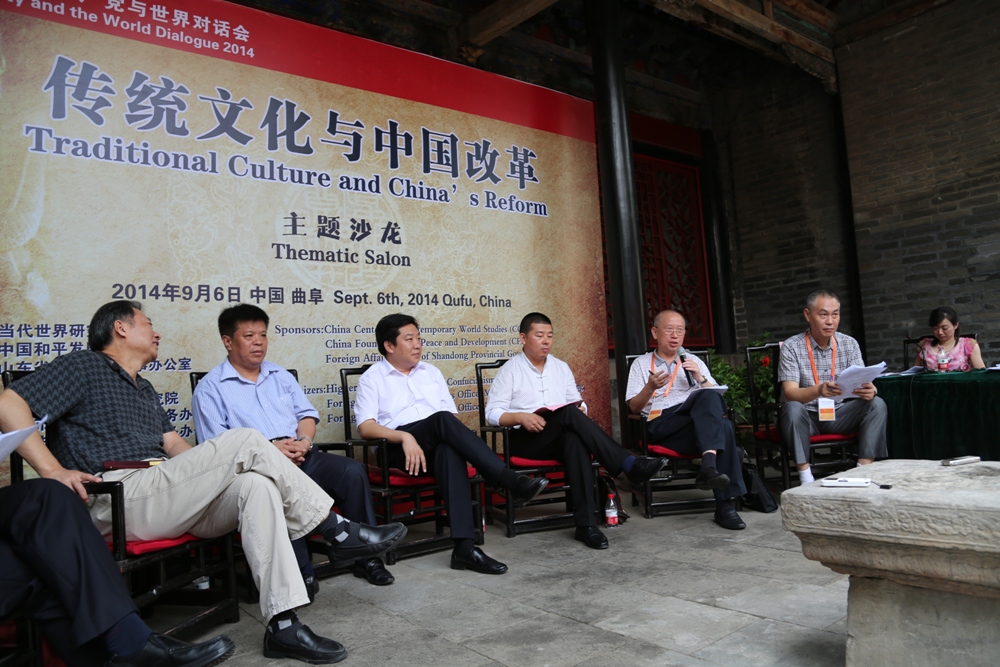


Confucianism, the ancient wisdom that has influenced China as well as East Asia for thousands of years, was brought into spotlight again on Sept. 6, 2014, in Qufu, the birthplace of Confucius (551 - 479 B.C.), in east China's Shandong Province.
More than 30 scholars and officials from China and abroad gathered in Qufu to attend the Salon: Traditional Culture & China's Reform and questioned how the time-honored philosophy of Confucianism could maintain its relevance in today's China and the rest of the world.
Pan Wei, Director of Peking University's Center for Chinese and Global Affairs, said China's current reform is highly market oriented and the renaissance of traditional culture is a reaction of morality in the wake of the market economy.
"The Chinese traditional culture of Confucianism is not a religion," said Pan. "It provides people with a practical means of ruling the country and behavioral ethics."
Wang Jianmin, Director of the Contemporary Socialist Research Center of Shandong University, said all concepts and behaviors for individuals, communities, societies and even countries are dependent on tradition. The Communist Party of China, the country's ruling Party, has always stressed the importance of Confucianism in its socialist core values.
Confucianism, which is based on humanistic philosophy, shows respect and love for individuals and highlights peace and harmony, which has always been a pursuit of the Chinese people, Wang said in answer to a question about applying Confucianism to world issues, citing China's peaceful diplomatic means of using dialogue instead of violence to solve regional and world disputes.
"Confucianism, the pillar of fine Chinese tradition, has exerted a larger influence on the country than any other tradition," said Yang Chaoming, director of the China Confucius Research Institute.
The five Confucian constant virtues of benevolence, righteousness, propriety, wisdom and fidelity convey not only the art of interpersonal relationships but also a model for governance. It is in accordance with our current social values in China, commented Yang.
Founded on these humanistic ideas, Confucianism pays attention to the needs and suffering of the ordinary people and protects their interests. This is reflected in many of the famous sayings of Confucius, such as "The king is the boat and the common people the water; the water can carry the boat, but it can also capsize and sink the boat." The well-known Chinese scholar Mencius also said, "The people are the most precious, the state is second, and the ruler the least."
Many scholars at the salon agreed that Confucianism should and could play a more and more important role in China's further reform as well as on world stage in solving world problems.
Last year General Secretary Xi Jinping of the CPC Central Committee added voice to the chorus during his last year trip to the cradle of Confucianism, Qufu. Xi said that China should adapt ancient forms of historical culture, especially moral norms passed down from our ancestors, for present-day use, bring forth the new through the old, and treat and inherit historical culture critically.
"Our nation will always be full of hope as long as the Chinese pursuit of a beautiful and lofty moral realm continues from generation to generation," Xi said last November.
The salon was held by the China Center for Contemporary World Studies (CCCWS), the China Foundation for Peace and Development and Foreign Affairs Office of Shandong provincial government as one of the activities of the Party and the World Dialogue 2014.
- CCCWS Director General Jin Xin Meets with IISS Director General Dr. Chipman 2017-04-13
- CCCWS Director General Dr. Jin Xin Meets with GIZ Special Advisor 2017-04-06
- CCCWS Director-General Jin Xin Leads a Delegation to Ethiopia 2017-04-06
- CCCWS Director-General Jin Xin Leads a Delegation to Egypt 2017-04-06
- CCCWS Director-General Jin Xin Leads a Delegation to Egypt 2017-04-06